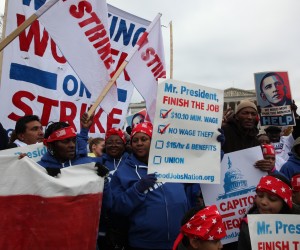
By Tamara Draut
The polls are closed, the ballots are counted, and voters overwhelmingly supported progressive policies that will help rebuild the middle class, even while the Democrats lost the Senate.
According to exit polls from the Washington Post, 45 percent of voters consider the economy the most important issue facing the country, far surpassing foreign policy, health care and immigration. The same poll found that 63 percent of voters believe the American economic system favors the wealthy, and 70 percent of voters believe the economy is in poor condition. Voters who considered the economy their biggest concern split their votes almost evenly between the two parties.
Americans are in search of leadership to take significant action on the economy and raising the minimum wage is an obvious place to start. This Election Day alone, four red states—Alaska, Arkansas, Nebraska, and South Dakota—passed ballot initiatives to raise the minimum wage. Voters in San Francisco raised the city’s minimum wage to $15. While the President can’t force Congress to finally raise the federal minimum wage, he does have the authority to raise living standards for millions of federal workers through executive action.
The president already used this authority by raising the minimum wage for federal contractors to $10.10 and getting tough on federal contractors that violate labor laws. But there is still power in his pen that could be used to help the working class, millions of whom are directly or indirectly paid through federal contracts. He could, for example, give preferential treatment in the contracting process to companies who pay workers at least $15 an hour, provide decent benefits, and respect collective bargaining rights. A recent post-election survey from Greenberg, Quinlan and Rosner shows broad public support for executive action on economic issues across the ideological spectrum, with 77 percent of Americans in favor of prioritizing these businesses when awarding federal contracts.
An executive order that gives model employers priority in federal contracts would raise the living standards of 21 million people–the 8 million workers and their families–who currently rely on low wage jobs conducted through federal contracts.
In the last two years, thousands of low-wage workers—including federal contract workers in Washington, D.C.—have gone on strike, rallying support and drawing public attention to poor pay and working conditions. Workers like Reginald Lewis, a food service employee at the US Capitol Visitor’s Center, who spends his days serving lawmakers and tourists visiting the architectural symbol of American Democracy–but who must rely on public assistance to make ends meet.
As Congress remains intransigent to the needs of the working class, our president can make a real difference in millions of people’s lives simply by setting higher standards for work being done on behalf of America with American tax dollars.
